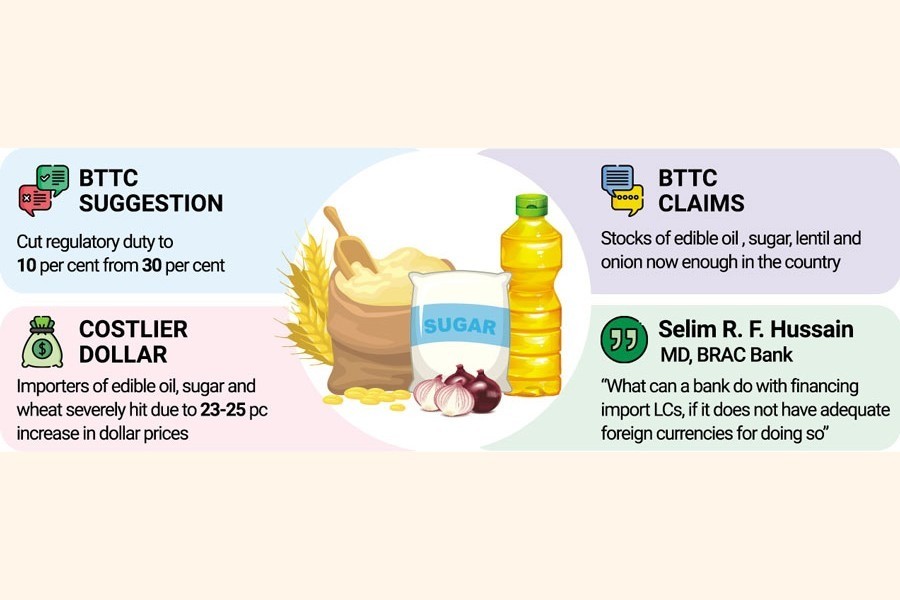Bangladesh Trade and Tariff Commission (BTTC) forewarned further supply disruption of key essential items on the domestic market for factors that include banks' reluctance in opening import LCs.
Among other factors is the prevailing supply scarcity of power and gas that stymied production.
Sources say the commission, as such, has submitted a set of observations and suggestions for government authorities to address the looming exigencies in the midst of quirky price rises.
It suggests reducing regulatory duty to 10 per cent from 30 per cent with an eye to keeping the sugar prices stable.
The government now receives Tk 29 as revenue per kg of sugar according to the existing duty structure.
The state agency mentioned that edible oil, sugar, and wheat importers faced losses due to the increase in dollar prices by 23 per cent to 25 per cent in the last three months. Currently, the importers enjoy a U-pass LC facility in importing edible oils, sugar, and wheat.
"Insufficient power and gas supply has been hampering production at commodity-producing units and that is increasing production cost, reducing supply of essential items and the factor is pushing up prices on the market," it is quoted as saying.
The BTTC finds the stock of edible oils, sugar, lentils, and onions now stable in the country in consideration of local production and imports.
But it mentions that the import of rice and wheat narrowed during a long period from April 2021 to September 2022.
There is now in stock more than 0.15 million metric tonnes of sugar and over 0.22 million tonnes in the pipeline to import that will meet 2.5 months' local demand.
"Currently, there has been enough stock of edible oils and sugar in the country, considering present stock and pipeline," the BTTC adds.
The BTTC fears and observations came in the wake of resentment expressed by industrialists and businesses over the prevailing supply shortage of power and energy caused by the dollar crunch.
They also sought necessary government steps to import LNG from the spot market for mitigating the existing problem and offered their readiness to pay higher for that purpose.
When asked, Managing Director and CEO of Brac Bank Selim R.F. Hussain acknowledged the ongoing foreign-currency crunch in the banking sector and said banks are doing their level best for opening import LCs.
"What can a bank do with financing import LCs if it does not have adequate foreign currencies for doing so?" Mr Hussain, who is also chairman of the Association of Bankers Bangladesh (ABB), posed the question.
The government has taken different steps to tackle the prices of key essential items. But, there is little or no impact on commodity prices despite the interventions. Day to day, prices of some key items, including sugar, are increasing and prices of edibles are higher at kitchen markets, a source concerned said.
Currently, sugar has become both scarce and expensive. The government could not bring under control the price of sugar despite taking multiple steps. And some state agencies often meet with traders for taking necessary steps to stabilise the prices of commodities.
Sugar was still selling between Tk 100/120 in the markets, despite the fact that the government set the price of packed sugar at Tk 95 per kg, and loose sugar at Tk 90.
This happens to be a sugarcane-crushing season in Bangladesh. But analysts at media talks say most state-owned sugar mills were lying idle. Private refiners of imports dominate the domestic sugar market.
In the wake of a surprise quantum leap in sugar prices, the state-run Trading Corporation of Bangladesh (TCB) began the truck sale of sugar from a private refiner with a state subsidy.
Meanwhile, Prime Minister Sheikh Hasina Wednesday called top importers and suppliers of commodities to her office for stocktaking of the market supplies and prices.
She told them "not to make excessive profit in order to alleviate people's hardship" at this hour of global crisis.
The prime minister also made a clarion call for increasing production in fields and mills so as to navigate the crisis.


